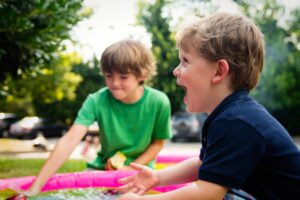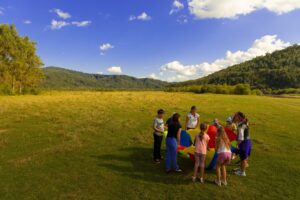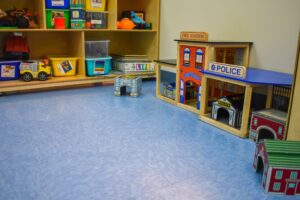
During Applied Behavior Analysis (ABA) therapy, children with autism spectrum disorder can learn skills that help them enjoy more fulfilling lives. But a fulfilling life doesn’t just take place in the home.
What Are Social Skills Groups (SSGs)?
Social Skills Groups are small gatherings led by a Registered Behavior Technician (RBT) or ABA therapist that give children an opportunity to focus on specific, personalized goals while playing team games and participating in group activities to improve social skills, emotional intelligence, and self-confidence.
SSG meetings often include instruction, roleplaying or practice, and feedback to help learners with ASD acquire and practice skills to promote positive social interactions with peers.
How Can Social Skills Groups Help?

In a recent study, forty-five children aged 8–12 years old were assigned to one of three groups: An SSG with unstructured play, an SSG with semi-structured play, and a waitlist control group.
Compared to the waitlist control group, children who participated in the SSG showed significant gains in social skills and social competence over time.
Another study showed some evidence that social skills groups improve overall social competence, confidence, and friendship quality in the participants. The study’s findings also suggest that many SSG participants see a decrease in loneliness and an increase in quality relationships as a result of their participation.
Social Skills Groups provide children who are already receiving one-on-one ABA therapy with a unique and enriching opportunity to socialize and interact with others. SSGs also give children a way to practice learned social skills, form connections and friendships with other participants, and have fun in a safe environment.
SSGs can help:
-
Improve social and communication skills
-
Build self-confidence and problem-solving skills
-
Achieve social and play goals
-
Practice skills learned through ABA therapy in a real-life setting
Social Skills Groups at Applied ABC

At Applied ABC, SSGs are a means to empower your child to thrive in their personal journey with autism through compassion, encouragement, and a fun learning environment.
Often, SSGs take place in an in-person autism therapy center. A typical day for a child participating in an Applied ABC SSG may include:
-
Visiting a sensory room and participating in sensory activities to gain energy and ground themselves.
-
Singing a welcome song, introducing each other, and practicing names.
-
Participating in identification activities like a matching game.
-
Playing a board game; crafts such as painting, building volcanoes, practicing grammar flashcards; or going for a walk.
-
Participating in activities geared toward gaining independence like hand washing or using the bathroom.
-
Discrete child training.
-
Sensory activities to relax before the end of the day.
Children may also have the chance to attend field trips to different educational and fun places with their therapists and families, such as a sensory-sensitive visit to a zoo, trampoline park, or a museum.
The more constructive and fun social skills training that children with autism receive, the more chances the children will have to practice their learned skills.
SSG Home With Me
Are you interested in joining but don’t have an Applied ABC center near you? Don’t worry, we also offer an SSG Home With Me program that gives families everywhere a chance to participate!
SSG Home with Me provides the same group therapy benefits as our in-center programs, but is hosted in the home of a local, volunteer parent. An RBT or ABA therapist is sent to coordinate the activities and make sure every child feels engaged and part of the fun! Host parents are provided with materials such as board games or tickets to the zoo so that the experience is on par with activities provided in center-based SSGs.
How Your Child Can Join an SSG
Having your child join an SSG is easy; schedules are flexible.
If your child is receiving autism therapy services from Applied ABC, reach out to your case manager.
If you have a child that has been diagnosed with autism and you would like them to start receiving ABA therapy through Applied ABC, you can fill out an autism therapy assessment here.



